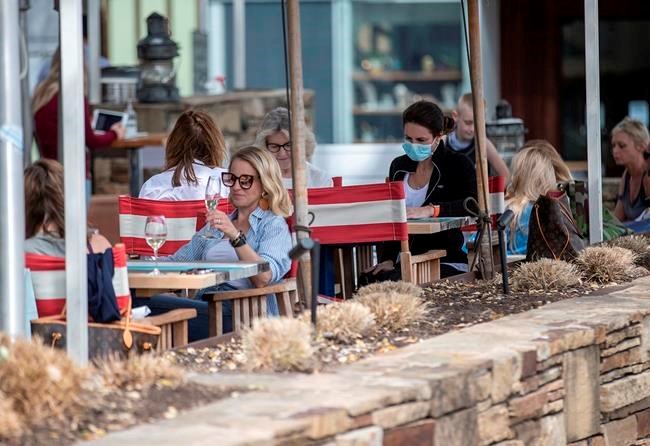AUSTIN, Texas — Asked how he spent the last 12 months, Rod Merritt doesn't mince words.
"It sucked," sneers the retiree, the contempt on his face obscured by a black mask emblazoned with the words, "I've Been Vaccinated."
Out for a morning walk in downtown Austin, Merritt and wife Deb, a camera around her neck, strike a vacationing couple's profile in their Hawaiian shirts, sun hats and matching face masks.
But the longtime Texas residents, it turns out, have lived in Austin for nearly 30 years, dressed for an adventure they only wish they could have as the COVID-19 pandemic continues running its course.
"We haven't been able to see our kids, I haven't been able to travel back to Wisconsin to see my elderly mother, and I've got seven siblings, so I haven't been able to see them," Deb says.
"All we could do is basically find places out of town where we go for long walks or ride bicycles, just the two of us," her husband adds, noting the couple is "nearly 70" and in a high-risk group.
"We've just been hanging tight for the last year."
So has much of the rest of the United States — particularly those Americans who were lucky enough to ride out a global public health crisis in the privacy of their own homes.
The numbers tell a stunning tale: Nearly 30 million cases out of 120 million worldwide were in the U.S., with more than 530,000 deaths to date.
The Center on Budget and Policy Priorities, a progressive U.S. think tank, estimates that as many as 38 million people live in families where at least one adult has lost work due to the pandemic. An estimated 30 per cent of the jobs lost in the U.S. over the last year are likely never to return.
Dr. Rochelle Walensky, director of the Centers for Disease Control, offered a glimmer of hope Wednesday when she said average deaths per day, the number of new cases and the hospitalization rate are all trending downward.
Vaccinations are also on the rise — more than 98 million doses had been administered across the country, according to the Centers for Disease Control. President Joe Biden expects to have at least one vaccine dose on hand for every U.S. adult by the end of May, although administering those doses will take longer.
In a prime-time address to the nation Thursday, the first of his presidency, Biden went further, directing states to make all of the country's adults eligible for vaccine by May 1.
He urged Americans to keep up what he acknowledged has been a long, bitter and tragic fight — to persist in wearing masks, washing hands and staying six feet apart.
"By July 4, there's a good chance you, your families and friends will be able to get together ... and have a cookout and a barbecue and celebrate Independence Day," Biden said.
"After this long, hard year, that will make this Independence Day something truly special — where we not only mark our independence as a nation, we begin to mark our independence from this virus."
And he implored people to get the shot as soon as they become eligible, promising a suite of tools in the days ahead to streamline and speed up the vaccination process.
"I can tell you, as somebody that's now well past our second vaccination, it feels a lot better once you get it," Merritt said.
"We're still wearing masks to protect others, but we don't worry at all about ourselves any more. And hopefully that vaccination is going to come to everybody much faster now."
That, combined with the fact more than 20 million Americans have already had COVID-19, is slowly, gradually, denying the virus the fuel it needs to spread — and fostering cautious optimism across the country.
"We ask for your patience in practising proven prevention measures for just a little while longer," Walensky pleaded. "We are so very close."
That message seemed to be getting through in Austin, where there was clear evidence Thursday that locals are choosing the public health path over the freedom offered by Texas Gov. Greg Abbott.
Abbott ended the statewide mask mandate and allowed businesses to reopen at full capacity this week, a decision cheered in some parts of the state but largely ignored in this famously liberal redoubt.
A Fox News host declared, "This is freedom," as the camera panned across a restaurant filled with maskless patrons in McKinney, a city just north of Dallas. And Attorney General Ken Paxton is taking Austin to court over its local mask rules.
"Oh, hell, no," Merritt said when asked if he supported Abbott's decision to end restrictions. "Our governor's a total ..."
"Idiot," Deb Merritt offered.
El Paso Mayor Oscar Leeser wrote to Abbott last week pleading with him to let Texas municipalities decide for themselves whether to require residents to wear masks.
Austin Mayor Steve Adler retweeted Thursday a copy of the letter, which describes how Leeser's two sisters and his brother came to visit their sick mother before she succumbed to the virus in November.
"My sisters wore a face mask and were not infected. My brother did not wear a mask," Leeser wrote.
"Sadly, we lost my brother on Christmas Eve ... If my brother had worn a face mask, he would still be alive today."
This report by The Canadian Press was first published March 11, 2021.
James McCarten, The Canadian Press
Note to readers: This is a corrected story. An earlier version misspelled Rod and Deb Merritt's last name.



